Articles of Faith
Let's have a look at some pop art to continue the Things Fall Apart series, this time an entry in the Comfort Suite.
In considering the various responses to the themes of my ongoing series, I've been wondering what helps keep things together even when there is much cause for despair. Culture and art are the standard answers it seems. Another partial (if obvious) explanation in Africa is religion, and consequently the topic of this note is articles of faith. My entry point to the discussion will be a few Nigerian calendar posters that The Wife bought in Northern Ghana in 1999. Christianity and Islam are among the visible competitors in the cultural and political marketplaces of Africa and are no strangers to advocacy for our souls. Thus I direct your attention to a photoset: Articles of Faith.
The artist is a certain R. Nkwonta of CAS Creation; God's Providence Printers of Mushin, Lagos are the publishers. Posters and sign art of this sort are quite popular throughout West Africa. Nkwonta's are among the most distinctive I've seen. Religion and various social mores are his favoured topics and they are tackled with aplomb.
We are in the realm of pop art and agitprop - guerrilla marketing, in short, in the service of the Good Lord. Of late, there has been the move to digital presses but the motifs of traditional sign drawing have been preserved in these handpainted posters. The graphic style might be labeled folk art by ethnographers, or crude or primitive to certain eyes, indeed the strokes are broad and exaggerated. Much like traditional African theatre, or say the newfangled Nollywood movies, realism is beside the point. Rather it is all about the message, this is engaged art.
But less prose, let's start, if you will, with the downfall of Satan.
Fall from Grace
The story recounted in this poster is "The Glorious Victory" of Jesus over Satan in a hard fought wrestling match. It is worth paying attention to the panels of this low brow tale of angels and demons; a close reading is revelatory.
Each panel you'll note is accompanied with the requisite quote from scripture. A few typos notwithstanding, the point is easily conveyed. First:
Our Lord Jesus Christ is ready to high jack Satan.Then:
Satan makes first attempt but Jesus cleverly dodged it.English is not the author's first language but we'll admit that the malapropisms are inspired: "dogged" is a good stand-in for "dodged" since the horned Satan is behaving like a vicious dog after all - not to mention his attire. The "high jack" spinebuster is an apt counterpoint to the "down fall" of the poster's title.
Presumably God, as the Supreme Justice, is the wigged-out referee in this wrestling bout. Also note that Jesus's tattoo, with the "Gilly Mercy" inscription, seems to shift position, from arm to back to chest, once again proving that the Lord works in mysterious ways. I hope one of my Nigerian friends can step in with a translation for Gilly (it is igbo right?).
The fight is on and a curious dance seems to take place. It's not quite a foxtrot it's more like a capoeira. Nkwonta later explains that "Satan bowed with his knees to our Lord Jesus Christ". This is only fitting and we can treat the horned beast like the "empty vessel" he is.
Soon enough we get to heart of the matter namely: "Our Lord Jesus Christ has beaten Satan to self unconscious". This is accompanied by Jeremiah's prophetic warning that "I will destroy you with my hands".
The dripping blood from the wounded Satan is of no matter, this is an Old Testament aesthetic. We are told that "the Devil wanted to run away from the ring but Jesus drew him back to smash him more". As he drags Satan by the tail, Jesus's efforts are duly backed up with the words of Genesis 3:15:
I will crush your head.My sunday school days of yore aren't too distant hence I would hazard that this verse refers to God admonishing Adam, Eve and the serpent.
Wrestling is a big tradition in certain parts of Nigeria. Nkwonta is undoubtedly a wrestling aficionado as are his protagonists who know all the high jacks and other sundry moves. We can only marvel at the technique displayed as "Jesus turned the devil upside down in order to destroy him".
Thus we see that a "pin fall marks Satan's defeat" and, finally Of course, Jesus is declared the winner.
"Up! Up!! Jesus, Down! Down!! Satan" is the ultimate message.
As the spirit descends in the form of a dove, Jesus, his six-pack abs rippling, holds his title belt aloft and delicately steps on the bleeding (and presumably permanently dealt-with threat from the perfidious Satan). Stepping on someone is about the most humiliating thing one can do; one can't understate the impact of the image is a society where respect and honour is paramount. All the time the angels smile and sing hosannas. My initial theory about God being the referee is proven mistaken, the bewigged referee is clearly part of the throng of angels. God is rather the spectral and enigmatic figure in the top right corner. The tropes of religious iconography have been duly satisfied.
Soul Struggle
We continue our discussion with a poster illustrating the ongoing competition for the soul of the African man.
No words are minced in the case of a hypocrite. The overt purpose of this exhortation is the shaming of hypocrites: those who, on the one hand, take up the the cross and bible and, the next day, turn to 'darker' matters shall we say. This is of course is often framed as a matter of tradition and modernity. There is much gnashing of the teeth in these areas and it is not just in matters of religion that this contest takes place. As an example, doctors in contemporary Africa steeped in the expensive western medical tradition often have to worry about their patients visiting traditional healers (typically dismissed as fetish priests and the like). In that case there is very real concern about the interaction of the drug regimes with herbal remedies and the plant impurities often found in them.
After heading to Church one day the hypocrite turns to worshiping of idols the next. Note the dark clouds forebodingly pregnant with tropical rain and worse. The chicken (or rather the fowl) to be slaughtered is at hand. The skull and bones, the dead animals, the bare-breasted woman in the shrine, this is the heart of darkness one might say. This is the popular conception of fetishes, juju, voodoo and traditional African religions. It is to be dismissed as superstition as testified to here by the clay or wood idolatry of the mask.
This has been a centuries old campaign in proselytizing of Africa in the encounter of Christianity and Islam with traditional African belief systems and religions. Those emblems of split allegiance are berated and ridiculed. The encomium is long
Woe to you hypocrites. You lock the door to the Kingdom of heaven to people's faces but you yourself don't go in nor do you allow in those who are trying to enter...A sample headline in recent weeks in Ghanaian newspapers is along the same lines: Doom For Corrupt Leaders – Pastor Predicts
According to the Pastor, though this year 2007 biblically was a year of double blessings, any mischievous politician or reverend minister who intended taking undue advantage of his/her position to exploit the people especially the poor and less privileged was in for "double curses".The accompanying image picked by the Ghanaweb editor to illustrate the devil is all pointy extremities as one might expect.
There is a long history behind Nkwonta's motif. Martin Meredith, discussing pre-independence Kenya, describes the oaths of loyalty the Kikuyu Central Association instituted in the 1920s:
the oath involved holding a Bible in the left hand and a handful of earth in the right hand pressed to the navel while swearing to serve the Kikuyu people faithfully.... [In the 1950s] the meat of a goat replaced the Bible... White farmers reported a mood of increasing truculence and incidents of cattle-maiming and sabotage.Back in Nigeria, Rems Nna Umeasiegbu spent a decade respectfully documenting Igbo traditions, customs and stories that appeared to be disappearing and published his findings in his 1966 book The Way We Lived. His illustration of a juju ceremony is in the same vein although perhaps a few minutes later than Nkwonta pictured it.
The missionaries and colonists faced this intractable problem and the churches that were their legacy are still combating it and even apparently with greater fervour.
I recently noted that Busia commented on this issue when he asked "Has The Christian Faith Been Adequately Presented?". He framed the question as follows:
Some missionaries who have served overseas have unhappy recollections of trusted converts reverting, on certain occasions, to 'pagan' beliefs and practices. The experience was all the more stunning when the converts concerned were not the more recent ones, but Christians of long standing, sometimes with fine records of conspicuous service and loyalty. The problem takes on a new dimension when it is presented as part of the general problem of the encounter between Christianity and indigenous cultures.He suggested a reversal of the typical context and advocated that the burden should be on the church to present itself as relevant to the local belief systems. In this vein, the art must reflect those themes - if only to subvert them; I suspect that Nkwonta is on board.
Match Made in Hell
A living religion must strive to be relevant to its practitioner's lives and interests hence we return to the sports motif with a football match between Jesus and Satan.
Despite the dastardly foul early in the game, Jesus dribbles past Satan for his first goal. As Matthew put it in his gospel "Get thou behind me Satan".
A lot of fun was had in these panels and with economy in the illustrations. Observe the Angel flying to the right of the goal post to block Satan's first attempt with an athletic catch - Petr Cech would be proud.
To punctuate Jesus Christ's first goal we return to that potent scripture quote: the crushed head business. Others translate it as "strike your head", regardless, trash talk doesn't get more direct.
The story proceeds:
Satan then makes his second attempt but the Holy Spirit was against him.The dove, embodying the spirit, diverts his attempt and the angel goalie, who had reacted tardily and would not have made the catch, skips happily, content at not having to make a difficult save. It pays to have friends in high places.
Note, later on, that Jesus heads the ball over the hapless defenders of evil. Evidently: "our Lord Jesus Christ has set confusion in the kingdom of darkness". Again the style displayed is akin to that of the writers of the New Testament gospels who strove in their depiction of Jesus's acts to underline the fulfilment of prophecies with pointers to passages in the Torah.
Interestingly enough there is a third goal depicted "when the Lord dribbled Satan to the ground which marked his second goal". Given that the final score (in smaller print at the top right of the poster) is 2-0 for Jesus, it must mean that the header of the other panel was disallowed by the referee. Alternatively this discrepancy might be a reference to the eternal mystery of the Holy Trinity in Church doctrine. Catechists beware.
As one would expect, a victory celebration marks the end of the match.
There is much that can be asked about these posters but we'll keep our exegesis brief. Do note, for what it's worth, that all the angels seem to be women. I won't dive too deeply into this female subtext (The Magdalene Propositions); I'll only note that the issue of female clergy and ordination of such is currently rending the Anglican and Episcopal churches apart (along with the stance on homosexuality).
Similarly I'll pass over the issue of the ethnicity of Jesus. Is he simply very tanned? And what about the nappy hair? Are those dreadlocks or just your typical semitic features? The tattoo tradition? Is this simply artistic licence in the pursuit of audience empathy or is a more subversive reading warranted?
Morality Plays
Overt religion is not the only mode that Nkwonta works in; social mores and behaviour fall under his purview - his is a complete worldview. Thus we turn to the case of Madam Long Mouth and Mrs Big Ear.
This poster is more in the vein of social commentary than religious admonition. He presents a typical morality play aimed at an audience who have recently left their rural abodes. The subject is "gossiping and the evil that follows it".
The object of her neighbour's gossip is saintly and minds her own business. "Yes let them say", she mutters to herself as she heads off to her good works.
As for the neigbours, suffice to say that "every time talk talk". Long Mouth and Big Ear chat unconcernedly, neglecting their household duties, while the goat takes advantage to eat the yam from their plate.
The next day Long Mouth returns, presumably for more of the same. Big Ear is glad to hear that "another news don land". She asks "abeg wetin happen?". The goat is equally happy for the visit and brays:
Abeg you are highly welcome. Have your sit [sic].
The subtext is clear: "The more you talk, the more your mouth long, and the more you listen, the more your ear big."
The lesson is to "keep your mouth shut", your food and more will go to waste.
Nkwonta's versatility with the poster motif has been rightly picked up by a few ethnology publications. Social anthropologists would have a field day studying his full body of work. Take for example his poster of The First Lady Wine Tapper. Social uplift is his message.
Elsewhere, and less successful artistically, similar painted movie posters have been exhibited. In those cases, instead of social commentary or religiousity, it is in service of lurid commericalism as in Extreme Canvas: Movie Poster Paintings from Ghana. To my eye those don't attain the heights I've shown here.
Nigeria, like many other countries in Africa, has been struggling to regain confidence after several lost decades. Along with the millennial implications of 1999, Nigeria was then just emerging from the suffocation of the Abacha years - waiting for an angel as it were. One coping mechanism for the years of arbitrary misrule and hardship was a turn towards these new Christianities. In a matter of a few decades, these currents are now asserting themselves prominently in the zeitgeist.
You may think the sentiment here is cartoonish, or dismiss it as crude, that it could only work in developing countries where audiences are cupid. I believe that the appeal is rather in their ingenuous charm. You know where you stand when confronted with this kind of rhetoric as opposed to some of the sophisticates we see in the West that are neither here nor there. Perhaps a certain simplicity has mass appeal in these troubled times. The spread of charismatic churches has been noted in Africa. Evangelicals and baptists are on the rise everywhere. In the US currently the arguments are over conservatism, Darwin's God, atheism and the like. The new Pope, per contra, thinks we should talk more about hell these days. Milton in Paradise Lost didn't shirk from this notion and indeed dove in with the definitive account.
We often dismiss the opium of the masses as dangerous, doctrinaire and simple-minded. Yet there is considerable humour when presented with this kind of whimsy. The themes are expansive, appealing and direct. The hard knock life is a staple of the Great Game. We are starved for meaning and religious types and their printing presses are quick to fill those gaps and "educate" our souls. One needs to get down and dirty to compete in the marketplace of ideas. Hilarity is a weapon of choice.
Nkwonta seems to have fully internalized those beliefs; his creations are testament to ground level pragmatism. Springing from the trenches, he produces his tokens one panel at a time, bite-sized gestures towards a certain spirituality. This is a complex piece of advocacy, an expression displayed without artifice. Low brow it may be but this is art in full, and effective at that. You certainly can't be indifferent to these articles of faith.
Soundtrack for this note
A short playlist on our theme (spotify version)
- Stevie Wonder - Superstition
Mr Steveland Morris jumps inWhen you believe in things that you don't understand,
The alternative of course is the black magic of the wonderful Higher Ground from the Innervisions album.
Then you suffer
Superstition ain't the way - Wayne Shorter - Juju
Dense, tense and full of turmoil, this is the music of conflicted souls. It features Wayne Shorter's virtuoso saxophone pouncing from the dark on Elvin Jones drums and McCoy Tyner's piano. - King Sunny Ade - Juju Music
Sunny Ade's laidback juju music continues to be a touchstone in West Africa. It is a conversation that calls out to listeners to participate. There are no boundaries between the musicians and the audience. Fodder for those late nights in urban spots, seductive sounds for all night comfort suites.
Next: Faith Healing
File under: art, pop, religion, poster, faith, tradition, modernity, superstition, christianity, culture, interplay, humour, whimsy, wit, Nigeria, Africa, angels, demons, analysis, Things Fall Apart, juju, toli
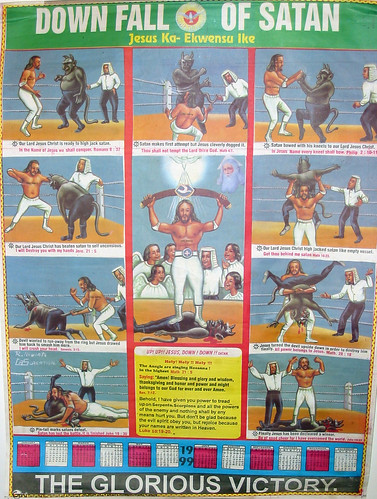
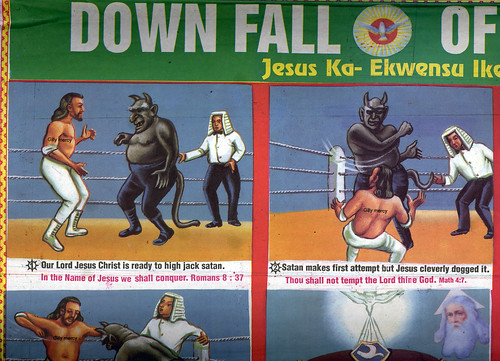
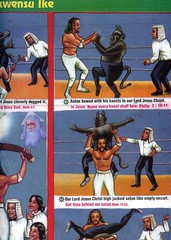
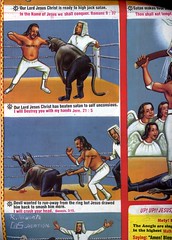
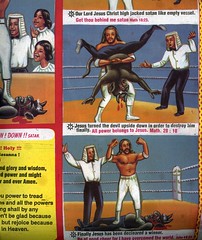
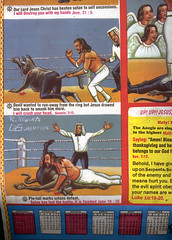
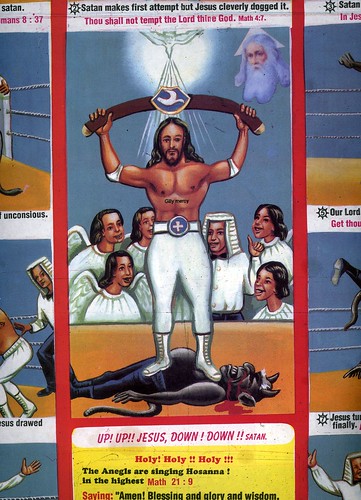
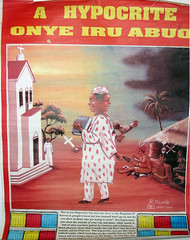

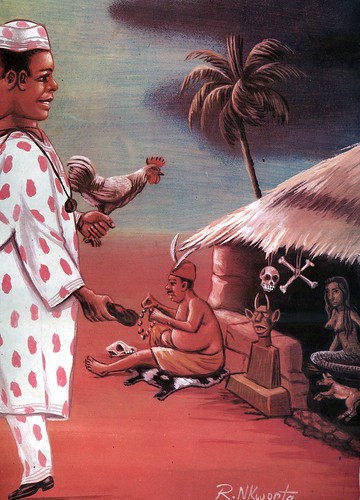
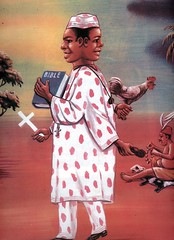
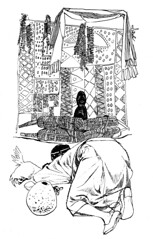
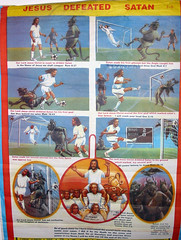
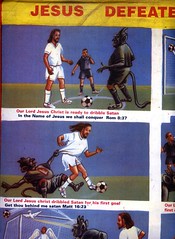
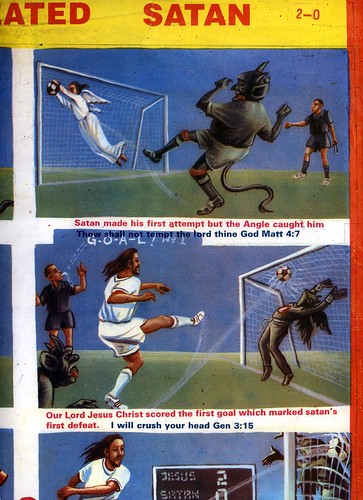
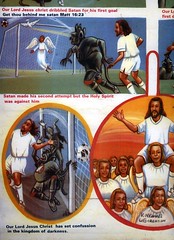
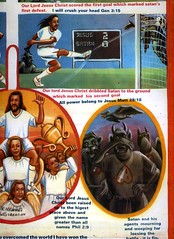
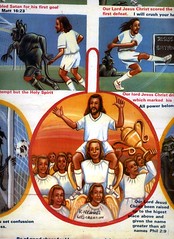
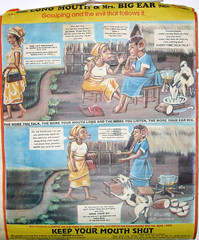
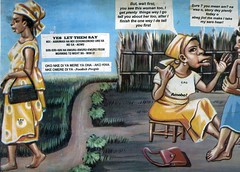
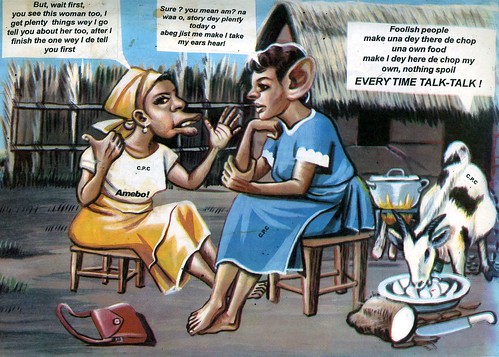
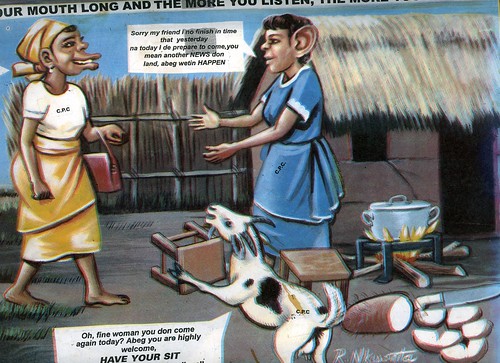


2 comments:
I have the Jesus vs. Satan poster in my hallway! It's my favorite piece of art. I found your post when my friend and I were pondering what "Gilly mercy" means. I like your explanation.
White jesus? Black devil? REALLY?! Spiritual damage of the worst kind! smdh! so sad!
Post a Comment